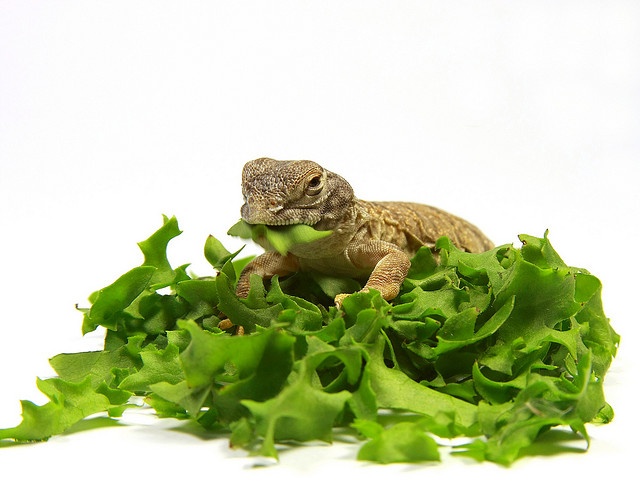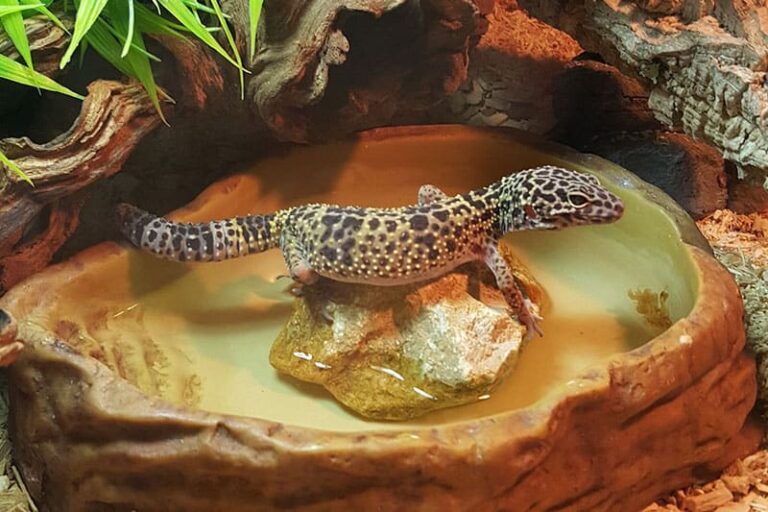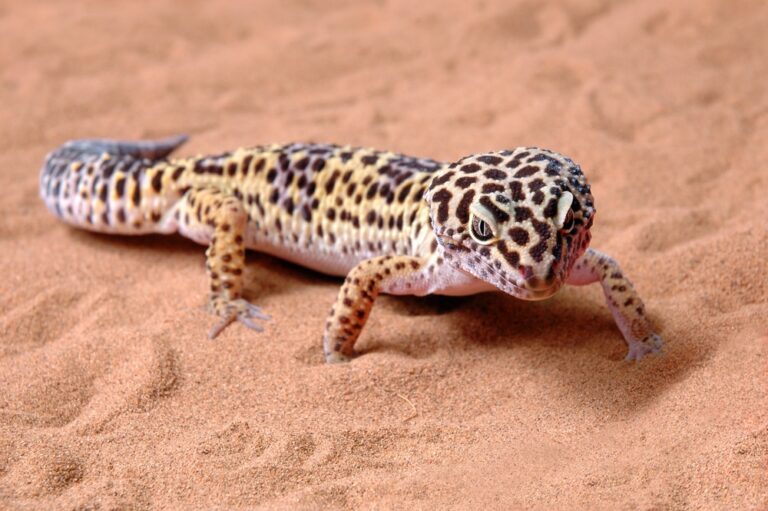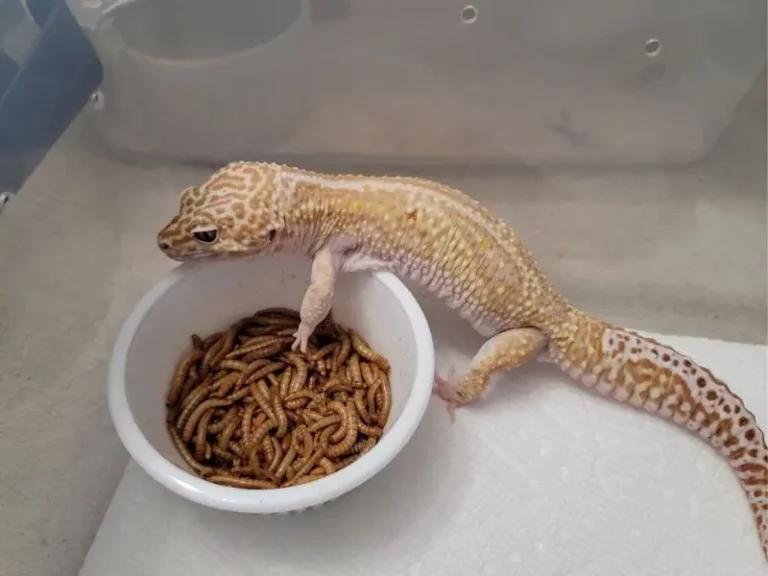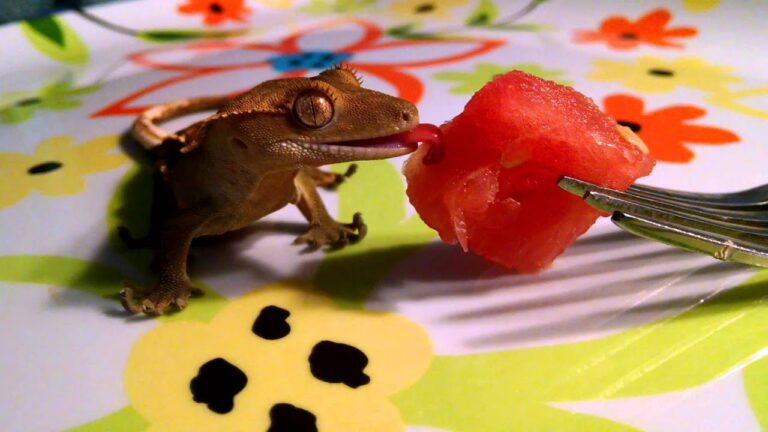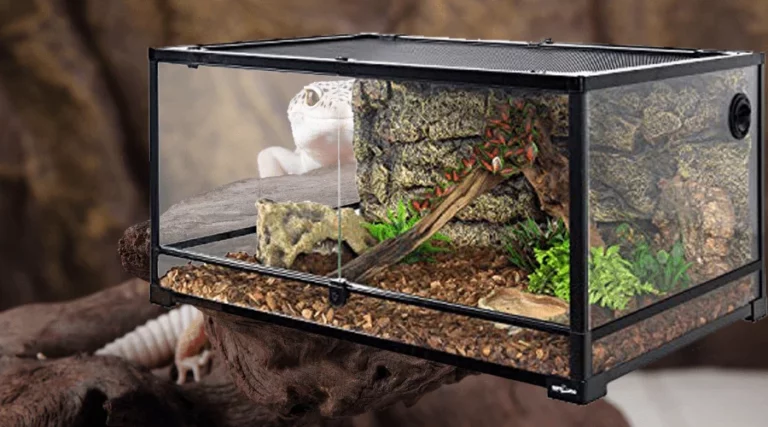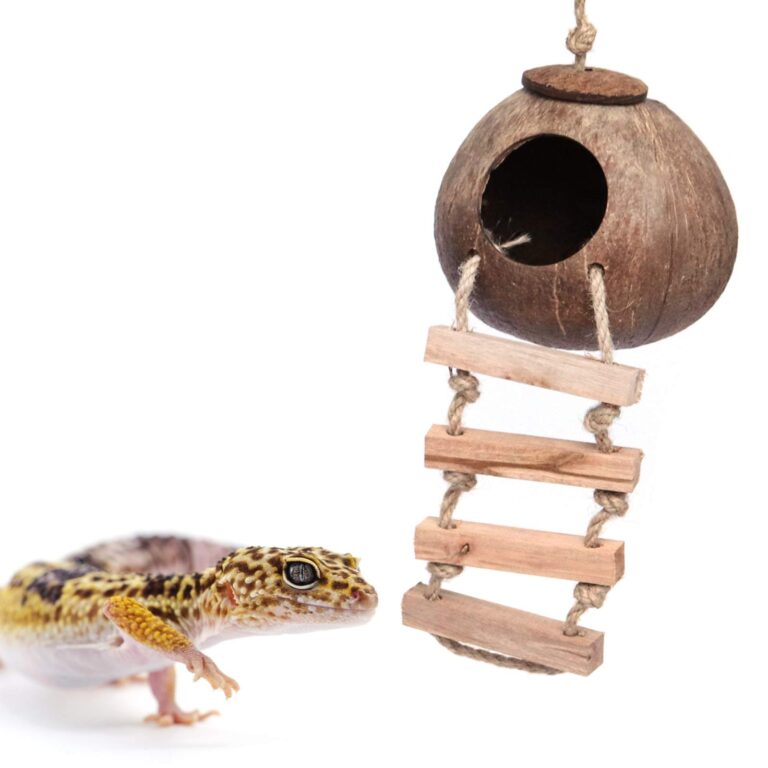Can Geckos Eat Lettuce? Reveal The Dietary Chart
As I gazed at the miniature world inside the glass walls of my terrarium, I couldn’t help but wonder about the culinary preferences of my newfound companions—geckos. Their delicate and vibrant appearance captivated me, and I was determined to provide them with the best care possible. Among the many questions swirling in my mind, one stood out: Can geckos eat lettuce?
Yes, while they can eat lettuce sometimes, but it’s not recommended. Also, it has lots of water but very few nutrients, so not the best choice for their diet. They should mostly eat bugs like crickets and worms.
In this quest for knowledge, we’ll explore the nutritional needs of geckos, their intriguing digestive systems, and whether lettuce fits into their menu. Let’s get started.
Nutrition of lettuce
| Nutrient | Amount per 100g |
| Calories | 5 kcal |
| Carbohydrates | 1.01 grams |
| Dietary Fiber | 1.3 grams |
| Sugars | 0.42 grams |
| Protein | 0.49 grams |
| Fat | 0.08 grams |
| Vitamin A | 247 micrograms |
| Vitamin C | 5 mg |
| Vitamin K | 36.5 micrograms |
| Folate | 38 micrograms |
| Calcium | 36 mg |
| Iron | 0.47 mg |
| Magnesium | 7 mg |
| Phosphorus | 12 mg |
| Potassium | 194 mg |
| Sodium | 5 mg |
| Zinc | 0.18 mg |
| Copper | 0.042 mg |
| Manganese | 0.112 mg |
Potential Benefits of Lettuce for Geckos
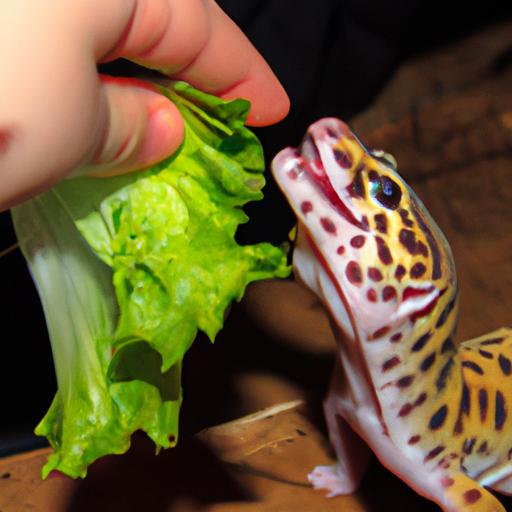
Hydration Support: possess a high water content, aiding in maintaining proper hydration levels for your gecko. Ensuring they stay well-hydrated is essential for their overall health.
Nutritional Variety: It also, offers a diverse range of essential vitamins and minerals, including vitamin A, vitamin K, and folate. These nutrients are vital for your pet’s well-being, supporting aspects such as skin health, vision, and immune function.
Digestive Health: The dietary fiber found in it can promote healthy digestion in, potentially preventing issues like constipation. This dietary addition contributes to their overall digestive well-being.
Preventing Dietary Monotony: Introducing it can diversify your gecko’s diet, staving off dietary monotony. This variety encourages natural foraging behaviors and can make mealtime more engaging for your pet.
Low Oxalate Content: Unlike certain ones with higher oxalate levels, such as spinach, leafy greens like lettuce have lower oxalate concentrations. This makes them a safer choice, reducing the risk of calcium absorption interference.
Remember that while lettuce has these advantages, it should not constitute the primary nutrition for your gecko. They rely on a balanced diet comprising insects as their primary protein source, complemented by other vegetables and fruits.
Further, it should serve as an occasional treat to maintain a well-rounded diet. Always consult with a veterinarian or reptile expert for species-specific dietary recommendations tailored to your pet’s unique needs.
Risks and Concerns of eating lettuce
Pesticide Residues: One of the primary concerns with consuming it is the potential presence of pesticide residues. Conventionally grown lettuce may be treated with pesticides, and residues can remain on the leaves even after washing. It’s advisable to opt for organically grown when possible to reduce this risk.
Foodborne Illness: especially if not handled or washed properly, can be a source of foodborne illnesses like E. coli and Salmonella. Contamination can occur during the growing, harvesting, or packaging processes. To minimize this risk, it’s crucial to thoroughly wash and handle it before consumption.
Allergies: While relatively rare, some individuals may have allergies to certain types of lettuce or the proteins found in them. Symptoms can range from mild discomfort to severe allergic reactions, so it’s important to be aware of any known allergies.
Nutrient Variation: The nutritional content of it can vary based on factors such as the type of lettuce, growing conditions, and harvesting time. Some lettuce varieties are more nutrient-dense than others, so it’s important to consider the specific nutritional benefits when choosing which type to eat.
Limited Nutrient Profile: While a healthy choice, is relatively low in calories and may not provide a wide range of nutrients compared to other vegetables. Relying solely on it for nutrition may result in an incomplete diet.
Digestive Issues: Some people may experience digestive discomfort when consuming large quantities of raw lettuce. This can include symptoms like gas, bloating, or cramping. Moderation is key to avoiding such issues.
Oxalates: It contains oxalates, compounds that can contribute to kidney stone formation in susceptible individuals. If you have a history of kidney stones, it’s advisable to consume lettuce in moderation and consult with a healthcare professional for dietary guidance.
Environmental Concerns: The cultivation of it, especially when monoculture farming practices are employed, can have environmental impacts, such as water usage and soil degradation. Being mindful of the environmental footprint of lettuce production is a broader concern.
Lettuces You Can not Offer To Geckos
While offering a variety of leafy greens can be a healthy addition to your gecko’s diet, there are two types of lettuce that should be strictly avoided due to their potential health risks.
1. Iceberg Lettuce: Iceberg lettuce, often known for its crisp texture, may seem like a viable option, but it’s far from ideal for your gecko. This lettuce variety is nutritionally lacking, offering little to no essential vitamins and minerals.
Moreover, Feeding it to your pet could result in potential vitamin and mineral deficiencies, which are detrimental to their overall health. Moreover, iceberg lettuce has a high water content, which, if consumed excessively, can lead to health issues for your gecko.
2. Lactuca or Wild Lettuce: Despite its mild, milky flavor and creamy-white leaves with a blue tinge, lactuca or wild lettuce belongs to the same family and should be strictly avoided in your crested gecko’s diet. This lettuce variety contains toxic alkaloids that can be harmful, even lethal, to your pet.
Lettuces You Can Offer To Geckos
1. Romaine Lettuce: It stands out as an excellent choice, brimming with essential minerals and nutrients that can benefit your crested gecko’s health. It’s particularly rich in potassium, calcium, and phosphorus, ensuring your pet won’t face any deficiencies when it comes to these vital minerals. By incorporating into their diet, you’re helping to provide a well-rounded nutritional profile.
2. Butterhead or Boston Lettuce: including varieties like Bibb or Boston lettuce, is another viable option for your crested gecko. These lettuce types are characterized by their relatively shallow leaves and low water content. This feature makes them suitable for your pet’s diet, as they won’t contribute excessive moisture intake, which can potentially lead to health concerns.
Alternative options of lettuce
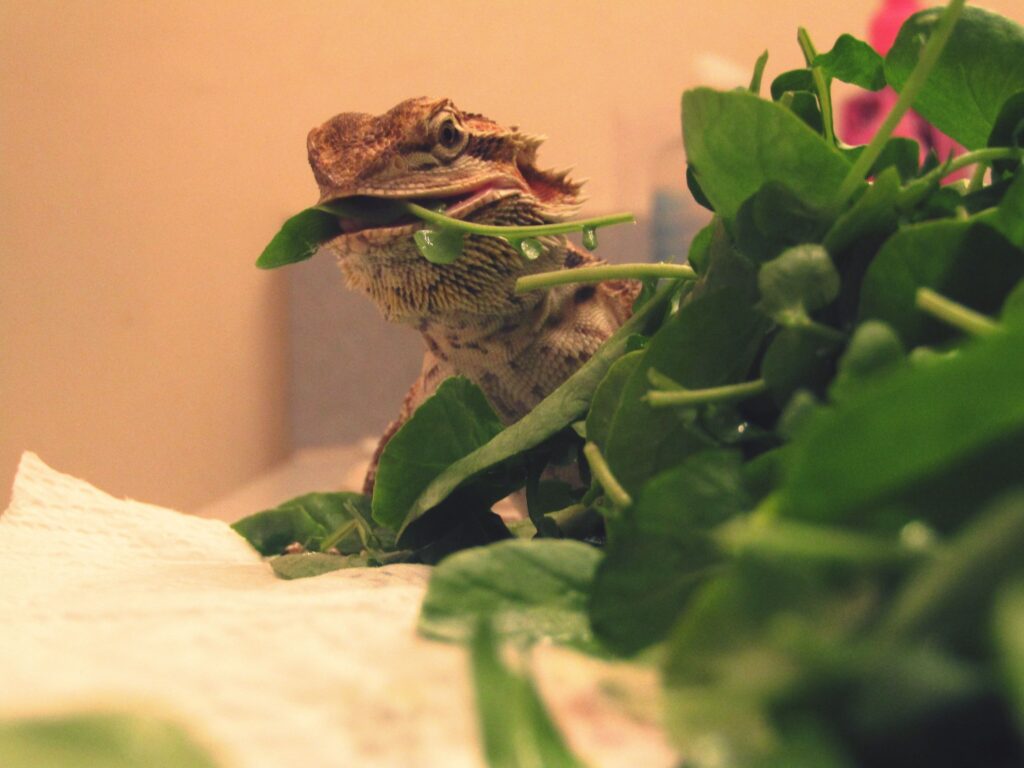
1. Dandelions: While their leaves may have a slightly bitter and peppery taste that’s not to everyone’s liking, they offer a nutritional powerhouse for your gecko. Packed with essential calcium, vitamin A, and vitamin K, these greens provide an impressive array of nutrients that can support your pet’s health.
2. Mustard Greens: These dark green leafy wonders are rich in calcium, potassium, and vitamins A and C. Not only are mustard greens a fantastic choice for your gecko, but they also make a superb addition to your own diet. Their nutritional benefits are undeniable, and they can add a delicious, slightly spicy kick to your meals.
3. Watercress: Despite its name, it boasts a relatively low water content, making it an excellent option for your pet. This leafy green is a vitamin-packed snack that outshines lettuce in almost every nutritional aspect. It’s a fantastic source of essential vitamins and minerals, and its mild, slightly peppery flavor can be quite appealing to both you and your pet.
FAQs
What vegetables can geckos eat?
Geckos can eat a variety of vegetables, including leafy greens like kale, collard greens, and dandelion greens, as well as squash, sweet potato, and carrots in moderation.
Can a gecko eat a salad?
Yes, geckos can eat a salad made from suitable leafy greens and vegetables. However, it’s important to ensure the ingredients are appropriate for their species and size.
Can house geckos eat lettuce?
Yes, While they can technically eat lettuce, it’s not the best choice due to its low nutritional value and high water content. Leafy greens like Romaine or collard greens are better options.
Can geckos eat iceberg lettuce?
No, It’s best to avoid feeding geckos iceberg lettuce. It lacks essential nutrients and consists mainly of water, which doesn’t provide the necessary nutrition for geckos.
What do geckos mostly eat?
Geckos are predominantly insectivores. They primarily consume insects as their main source of food. Additionally, some species may also eat small vertebrates, fruits, and leafy greens as supplements to their diet.
Final words
In conclusion, my exploration into whether geckos can eat lettuce has shed light on the topic. While it’s true that geckos can technically consume lettuce, it’s become evident that it’s not the most beneficial choice for them.
Furthermore, because of high water content and low nutritional value make it a less-than-ideal option for my companions. Instead, I’ve learned that providing a diverse diet rich in insects, nutritious leafy greens and fruits is essential to ensure their well-being. They should eat bugs more. By prioritizing their nutritional needs and making informed choices, I can help keep my buddy healthy and thriving.

